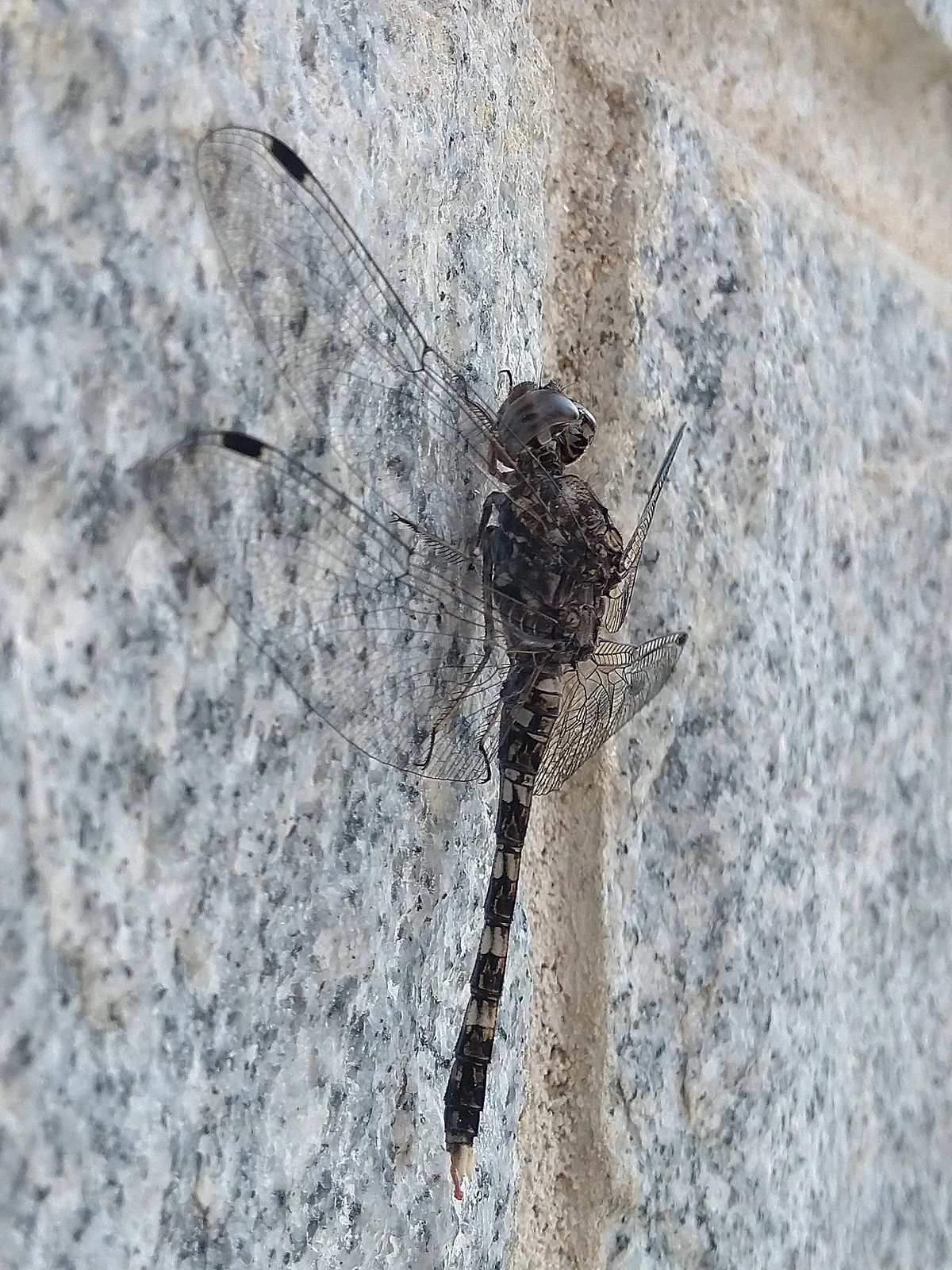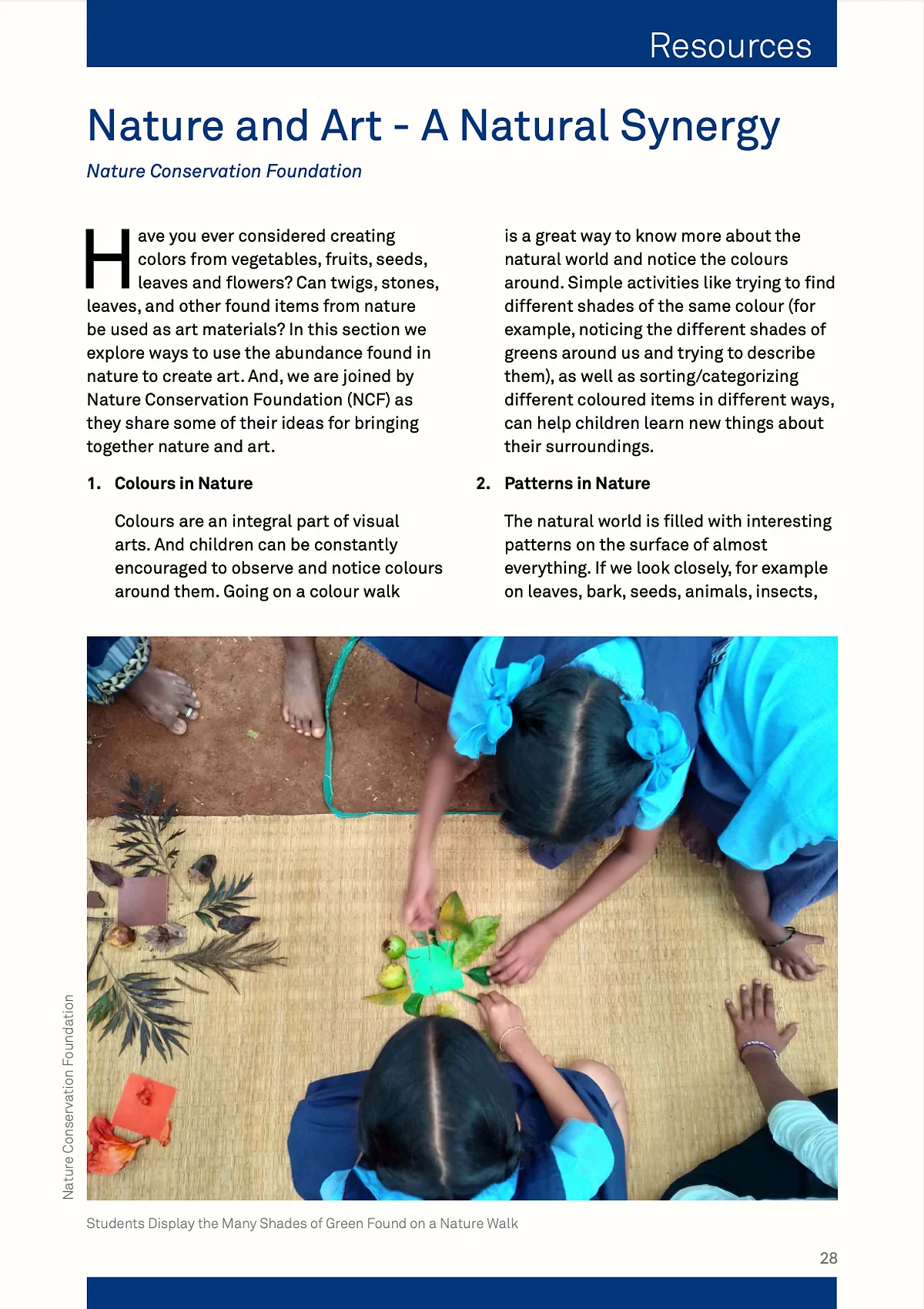Working with schools and educators to connect learning to the natural world
Nature Classrooms works with educators in India to connect school learning to the natural world. We develop age appropriate, locally and culturally relevant Nature Learning resources that support and enrich existing Environmental Studies curricula in primary schools.
Our work began in November 2018 and is based on consistent, collaborative engagements with school teachers and educators across diverse learning spaces and school boards.
Our Approach to Nature Learning
Our goal is to highlight different aspects of the natural world within the teaching-learning of the Environmental Studies curriculum in Primary Schools. We take a dynamic and collaborative approach based on classroom observations and conversations with in-service teachers and experienced educators, and envision Nature Learning as:
Nature Learning Resources
School-going children in urban and peri-urban spaces in India often grow up disconnected from the natural world due to limited opportunities and spaces to be introduced to and engage meaningfully with nature.
The Environmental Studies (EVS) subject is mandatory in primary schools, and provides a wonderful opportunity to introduce school children to nature and the environment around them. Unfortunately, a majority of schools in India are under-resourced, understaffed, and teachers are often overburdened. A subject that holds immense potential in helping children build a sense of belonging is therefore transacted like any other subject or worse, seen as extra curricular.
The last few decades have seen a number of schools and nature conservation groups conduct nature-based activities for children. Different programmes and initiatives like nature camps, birdwatching trips, setting up nature clubs and nature-themed events and talks have been very useful in getting a large number of people in India interested in nature. However, they are also often viewed as burdensome and unnecessary by teachers and parents as they fall outside of the school curriculum.
Lastly, a standardised curriculum full of non local and unrelatable examples about the natural world has meant that Indian students tend to view the natural world as inaccessible, far from their reach and not as part of their contexts and lived experiences.
Connecting Learning to the Natural World
Our engagement and work with schools and educators aims to connect children to nature around them by creating contextual, age-appropriate and diverse teaching-learning resources that correspond to primary EVS curricula (Class 1-5).
Our resources and curricula are created in collaboration with designers, educators and conservation researchers and practitioners. We actively partner with schools and teachers to conduct classroom observations and trials during EVS lessons, ensuring the materials are teacher and student friendly.
These resources are curated and designed to be engaging and effective teaching-learning tools enabling teachers to encourage their students to explore and bond with nature. These resources will soon be available as open source material on our upcoming online repository along with in-depth user guides on facilitation.
Engagement with teachers and educators
In an effort to encourage schools and learning spaces to adopt a nature learning approach to EVS teaching, we conduct and facilitate experiential workshops with teachers and educators.
We create an immersive experience for teachers, often away from their school campuses with opportunities for them to engage, reflect and reconnect with the natural world themselves before they take these experiences to their students. Since March 2020, we also offer these workshops in a hybrid or remote-learning format as needed.
During these workshops, we 1. Orient educators towards an inquiry-based nature learning approach and pedagogy, 2. Co-create and design resources for their specific geographical areas and 3. Assist them in implementing nature learning experiences in their learning spaces.
Online Resources
Since March 2020 , we have specifically created a few online resources for children and school communities. A sample is below. All our nature learning resources, curricula and pedagogical approaches will soon be available on a new website.
Hidden Housemates
Explore a whole new habitat by looking under a table, behind a picture frame, following a persistent sound or even peering into a bag of grains! We have put together a set of fun activities and games called "Hidden Housemates" for children to engage with nature in their immediate surroundings. Each sheet introduces you to 9 Hidden Housemates, who you can find in your own space using an illustrated bingo game. You can learn more about each of these through a list of specially curated resources and activities for all ages. Ready to get to know your Hidden Housemates? The activity sheets are available here: https://bit.ly/hiddenhousemates1
Nature Bingos
Would you like to explore nature around you? We have created a variety of Nature Bingos which are available in multiple languages here.
Video: Can you get COVID-19 from bats?
We have also created a video for school communities and children to increase awareness on bats and COVID-19 based on scientific research Recently, bats have been mentioned in the news in relation to the pandemic, which is leading to fear and uncertainty about the animals. Here is an educational video about bats and the COVID-19 pandemic for children, where a special guest will help answer some of their questions. Thanks to our very dedicated volunteers, this video is available in 11 different languages (English, Hindi, Kannada, Tamil, Telugu, Malayalam, Marathi, Kashmiri, Nepali, Gujarati, Bengali) for school communities across the country.
Multiple languages: https://bit.ly/batsCovid19
Our Social Media Handles: T: @NatrClassrooms; IG: natureclassrooms
More details and Nature Learning Resources here - https://www.natureclassrooms.org/
Lead: Vena Kapoor, External Consultant
Nature Classrooms Alumni: Roshni Ravi, Mythreyi Kumaraswamy, Labonie Roy, Adira Andlay



